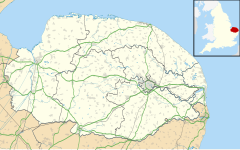Ingworth is a village and a civil parish in the English county of Norfolk.[1] It is 1.7 miles (2.7 km) north of Aylsham, 14.3 miles (23.0 km) north of Norwich, 7.3 miles (11.7 km) east of North Walsham and 9 miles (14 km) south-southwest of Cromer. The nearest railway station is at North Walsham, which is located on the Bittern Line between Sheringham and Norwich. The nearest airport is Norwich International Airport. The village is bypassed by the A140 road, 0.9 miles (1.4 km) to the west.[2] The village and parish of Ingworth had, in the 2001 census, a population of 94.[3] For the purposes of local government, the village falls within the district of North Norfolk. The population taken at the 2011 census remained less than 100 and was included in the civil parish of Erpingham.
| Ingworth | |
|---|---|
 St Lawrence parish church, Ingworth | |
Location within Norfolk | |
| Area | 2.12 km2 (0.82 sq mi) |
| Population | 94 (2001 census) |
| • Density | 44/km2 (110/sq mi) |
| OS grid reference | TG192296 |
| • London | 129 miles (208 km) |
| Civil parish |
|
| District | |
| Shire county | |
| Region | |
| Country | England |
| Sovereign state | United Kingdom |
| Post town | NORWICH |
| Postcode district | NR11 |
| Dialling code | 01263 |
| Police | Norfolk |
| Fire | Norfolk |
| Ambulance | East of England |
Description
editThe parish of Ingworth is very small and covers an area spanning only 212 hectares. The parish has borders with three other parishes. To the north is the parish of Erpingham, to the south-west is the parish of Blickling and the parish of Aylsham is to the south-southeast. The boundary with the parish of Blickling is indicated by the course of the River Bure which also skirts the western edge of the village. Part of the parishes northern boundary at Beech Lane is the designated long distance footpath known as the Weavers Way which runs for 56 miles (90 km) between Cromer to Great Yarmouth. Norwich road which runs north to south through the village and parish was once the main road from Norwich to Cromer before the Aylsham by-pass was built. This route can be clearly seen on Faden's large-scale map (at one inch to the mile) of the county of Norfolk of 1779.[4] The village has no pub, shop or post office although there is a traditional-style phone box. There is also a small playground provided by the parish council. The parish council meets monthly in the village reading room. The village's name comes from the Old English for Inga’s enclosure.[5]
History
editThe Domesday Book
editIngworth has an entry in the Domesday Book of 1085 where it, its population, land ownership and productive resources were extensively detailed[6] In the survey Ingworth is recorded by the names of Ingewrda and Inghewurda. The main tenants being the Roger Bigot and Reynald Fitzlvo. The survey also list that there was ½ a mill. In the Domesday survey fractions,[7] in this case ½ a mill, were used to indicate that the entry was on an estate that lay within more than one parish.[citation needed]
References
edit- ^ Ordnance Survey, Explorer Sheet 252, Norfolk Coast East, ISBN 978-0-319-46726-8
- ^ County A to Z Atlas, Street & Road maps Norfolk, Page 128, ISBN 978-1-84348-614-5
- ^ Office for National Statistics & Norfolk County Council, 2001. Census population and household counts for unparished urban areas and all parishes. Retrieved 2 December 2005.
- ^ Faden's Map of Norfolk 1797, Digitally redrawn in 2005 by Andrew Macnair. North Central Map ISBN 978-0-9550398-2-9
- ^ A Popular Guide to Norfolk Place-names: by James Rye: Published by Larks press, Dereham, Norfolk, 2000; ISBN 0-948400-15-3
- ^ The Domesday Book, England's Heritage, Then and Now, (Editor: Thomas Hinde), Norfolk, page 191, Ingworth, ISBN 1-85833-440-3
- ^ The Normans in Norfolk, By Sue Margeson, Fabienne Seillier and Andrew Rogerson, Pub:1994, Page 21, ISBN 0-903101-62-9
External links
editMedia related to Ingworth at Wikimedia Commons
